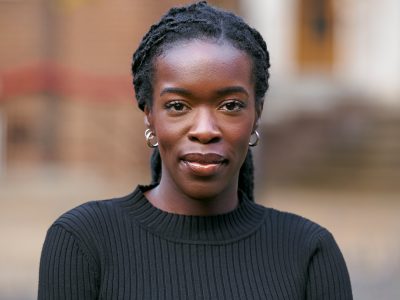When planning how to appropriately observe International Women’s Day, the women on our team at Byfield wanted to avoid marking the occasion with a one-off post on the agency’s LinkedIn page. The importance of the date prompted them to instead have a more substantive conversation about gender relations, feminism, intersectionality, patriarchy and allyship in the workplace.
Hattie Lunt and Kitan Olukoya talked with a male colleague, Tom Boulton, about their experience as young women, and examined the differences between their experiences and those of the men they work with, and count as friends, family and loved ones.
We believe this conversation represents a meaningful contribution on International Women’s Day.
Tom: “As young women raised in a notably more diverse generation, how has your early experience in the workplace compared with any expectations you had?”
Kitan: “I went into my working life with certain expectations of how I was going to be received. This made me shrink myself in certain instances which doesn’t reflect my personality. I have since learned that there should be a standard that you are respected and your voice matters. I do sometimes still fear how I will be perceived but I try to not let it be a block and always aim to be my authentic self.”
Tom: “Why is it important to have men as allies at work?”
Hattie: “Active male allies who support gender equality are integral to an inclusive culture, at work and beyond. Participate in the conversation but also instigate it: ask your sisters, mothers, partners, female colleagues how and what you can do better. View women as a source of insight and counsel on one hand, but also take the time (and responsibility) to do your own research on the other. Accepting feedback and learning from women’s experiences is key to addressing shortcomings or blind spots.
If a female colleague comes up to you as a male colleague and says, this comment/situation made me uncomfortable, first, recognise that you have an inherent privilege that when you speak you are more likely to be listened to, and second, acknowledge what she says, validate it, and then if that woman feels comfortable with you doing so, escalate it. If you notice that comment or situation happening again, say something. It is our collective responsibility to call out misogynistic behaviour, don’t assume the person directly or indirectly affected will say something.
A real ally in the fight for gender equality takes active steps to support and uplift women, listens to their experiences and perspectives without interrupting, and actively works to dismantle their own biases and privileges.”
Hattie: “Tom, what does it mean to you to be a feminist?”
Tom: “It goes beyond believing in equal outcomes for men and women and actually acting on that belief when you have the chance to embrace equity. My mother taught me to be a feminist, and to treat women and girls with love, respect, and kindness rather than contempt, spite, or disrespect.
As a (straight, white) man, I think being a male feminist means learning from and listening to the women around me. When they tell me how a man has hurt them, it’s not up to me to doubt or reject that; instead, I feel an obligation to them – and to myself – to hear her experience and respect her vulnerability, to be careful with it, and to work hard to ensure my own behaviour is never harmful, threatening or dangerous. I also feel a responsibility to hold men to that standard.”
Kitan: “The framework of intersectionality is a powerful tool that helps us acknowledge: one, that we all have different experiences of being a woman; and two, that there are intersections in society that can affect those experiences. It is essential that each of us is empowered and equipped to recognise and validate our individual experiences. Sometimes the intersection between marginalised groups in society can be challenging. However if we build more equitable workplaces, I believe this will create a more comfortable and productive environment.”
Tom: “Why is it important to you to observe International Women’s Day?”
Hattie: “I come from a long line of strong women. I am one of three sisters, and am surrounded by brilliant women both in my personal and professional circle. I feel empowered to take part in this conversation and celebrate the women in my life who have paved the way. However, although it is important to mark the moment, we must acknowledge that it should be happening every day.
Helen Cixous, my favourite French feminist writer and theorist from the 1970s, wrote in her seminal essay, The Laugh of the Medusa, ‘we must learn to speak the language women speak when there is no one there to correct us’. I live by this and will continue to encourage both men and women to do the same.
I am grateful to live in a time where we can have these conversations with the men in our lives and know we are listened to.”
Kitan: “I think it [IWD] is great. I think it should be acknowledged just like all the other important days in the calendar. I think it’s important to celebrate and value our differences. However you self-describe, if you describe yourself as a woman, celebrate yourself on the 8th. Celebrate the women that you know, the women that came before you, the ones who paved the way for you especially.
I’m very grateful to my mother and everything I do is for her memory. Everything I do is for my younger sister as well, to set the best example. I’m proud to be a woman. I’m proud to be a black woman. I hope I’m a good example of what a woman is. I hope they are proud of me.
My friends and women that are listening to this, I hope you pull up the men in your life and expect allyship from them. I hope men realise the impact that being an ally to women has, especially at work. Try to send the ladder back down for women so they can be pulled up if they need it. Recognise the impact you will make by speaking out.”

Kitan Olukoya

Tom Boulton

Hattie Lunt